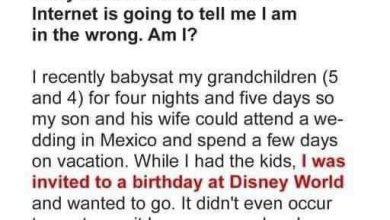We received an anonymous letter in our editorial with a request for advice.
“My MIL works at the hospital. When I announced my pregnancy, she was thrilled at the idea of delivering my baby and being THE FIRST TO HOLD IT to build a special connection with her first grandchild.”
“Like any mom, I wanted to be the first to hold my baby, so I BANNED her in the delivery room. This caused a huge scandal in our family. Everyone thought I was being unreasonable, including my husband. He believed it was safer for her to deliver the baby due to her experience and saw no issue with her holding the baby first. ’It’s her first grandchild; she has every right,’ he said. But I carried this baby for nine months, enduring all the pain and stress. I believed I had every right to be the first to hold my child.”
The conflict seemed resolved until the day of delivery came.

“When I was 10 days overdue, my water finally broke. After 24 hours of labor without progress, my doctor recommended a C-section, and we agreed. Since it wasn’t an emergency, my husband called our parents, who came to the hospital an hour later.”
“My MIL burst in, saying, ’You can’t resist now; I’ll do whatever it takes to help you!’ I glared at her, feeling a surge of frustration and exhaustion. The last thing I needed was her hovering over me in an already stressful situation. The nurses exchanged uncomfortable glances, unsure of what to do.”
“Straining with pain, I said, ’I appreciate your enthusiasm, but I need space right now. Please respect my wishes.’ My MIL stood there in shock. Her usual confidence wavered, a mix of hurt and bewilderment crossing her face. ’I apologize for our past fights. I just want to help,’ she said weakly, her voice cracking.”
“I replied firmly, ’I know. But this is something I need to do on my terms.’ At that point, I regretted being so angry with her, as she seemed to genuinely want to help.”
Any feelings of pity for her MIL quickly dissipated once the woman discovered what she had done.

“What I didn’t expect about the C-section was how quickly they get the baby out and how long it takes to stitch you back up. They showed me my baby, but my arms were strapped down with IVs, so I couldn’t hold her. She was taken to the nursery, and my husband went with her. It felt like ages, but probably only 30 minutes later, I was moved to the recovery room.”
“There, my baby girl was lying in her crib. Moved by my MIL’s act, I encouraged her to hold her granddaughter first.”
“When I asked if she wanted to hold her first grandchild, she laughed and said, ’Oh, I already did.’”
“At that moment, all my kindness vanished. I can’t describe how angry I was. I should probably add that no one else held the baby because they knew how important it was for me to do it first. I asked everyone to leave the room and didn’t want to see anyone for the next few hours.”
“Now, my husband and MIL think I’m being unfair. Am I overreacting? I would appreciate your advice.”
We thank you for sharing your revelation and have prepared a few tips.

© Alex Green / Pexels
Navigating family dynamics around childbirth can be incredibly challenging, especially when emotions and expectations clash. Here’s some advice to help you address the situation and find a way forward:
- Acknowledge Your Feelings. Your desire to be the first to hold your baby is completely natural. After carrying your child for nine months, it’s understandable to want to experience that first moment. Feeling hurt and angry when this didn’t happen is valid, and it’s okay to acknowledge those emotions.
- Communicate Openly with Your Husband. Your husband’s alignment with his mother over your wishes has created tension. It’s crucial to have an open and honest conversation with him about how you felt during and after the birth. Express how important it was for you to have that first moment with your baby and how his support is vital to you.
- Set Boundaries with Empathy. Setting boundaries with your mother-in-law is essential. Share with her how important it is for you to have your own experiences and moments as a new mother. Use “I” statements to express your feelings, such as “I felt disappointed because I wanted to be the first to hold my baby.” This approach can help her understand your perspective without feeling attacked.

- Rebuild Trust and Connection. After the incident, rebuilding trust and connection with your mother-in-law is important for family harmony. Consider small gestures to show you appreciate her role in your child’s life, even if boundaries need to be maintained. This can help in healing and creating a balanced relationship. Discuss and agree on expectations for future interactions to prevent similar conflicts. Establish clear guidelines about how you want to handle your parenting decisions and important moments moving forward.
- Get Support if Needed. Family counselors or therapists can provide a neutral ground for addressing ongoing conflicts and improving communication within the family. They can offer strategies to navigate complex emotions and relationships.
- Prioritize Your Well-Being. Remember to take care of your emotional and physical well-being as you adjust to motherhood. Surround yourself with supportive people who respect your wishes and provide a positive environment for you and your baby.
“I never force my son to say SORRY and THANK YOU — it could psychologically traumatize him,” another reader wrote to Bright Side to share her unique parenting style and to seek advice from other parents. She often faces criticism about her methods of upbringing and wants to know if other parents have had similar experiences.







